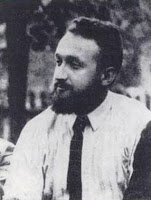Why shouldn’t a second Jewish Book be put together and edited and canonized, on the lines of our Bible? 377
A Bible is not an anthology, nor a history, nor a collection of documents. It is all of these together. The most important thing in a Bible is the bold, courageous, manly, human idea—the flowing line, not the precise dot. And the line is that man is good, and that absolute justice does exist, and that it will one day prevail; and that the Jews work for it and suffer for it, and though they often suffer more for it—for absolute justice— they don’t stop working for it, work more for it, in fact. But all this must not be said, must not be brought out apologetically. 379
A Bible is an undefinable literary form of its own. And part of its indefinability is its absolute truth, once it has been put together and canonized….A Bible is a Book of absolute sincerity, like life itself. A Bible is not written. It is put together of elements that already existed previously. 383
I don’t know who should put it together. No one may call the man, and appoint him. He must do it on his own. He must be a man without a name, or at least a man whose name is of little concern to him, as little as it concerned the compiler of the Psalms or the writers of the single groups of Psalms or the separate individual Psalms contained in the Psalter. 384
A Bible must take in not only fragments, words, figures, statistics, lists and what not which already exist—it can also have things written of it, even by quite nameless writers…The Bible takes in fragments of history fragments of stories and dramas, songs, poems, philosophy, aphorisms, chronology, letters statistics, constitutions, documents. These are the elements. Beyond that I can’t go. 388-389
Hardly necessary to say that a Bible would take in, without scruple, the word creations of non-Jews, as soon as it finds this necessary. Even if they take up a considerable amount of space. 389
The world demands from us a new Bible. Demands it, yet fears it. The world knows it has sown wind, and we owe it a storm. We shall not turn the other cheek in our second Bible…The second Bible will not be a J’Accuse, nor will it be the turning of the other cheek; it will be a chain of understanding and of making it clear that man is good and that God at best is indifferent. 391
–Melech Ravitch, “Why Not Canonize a Second Book of Books?”
—Great Yiddish Writers of the Twentieth Century, selected and translated by Joseph Leftwich
